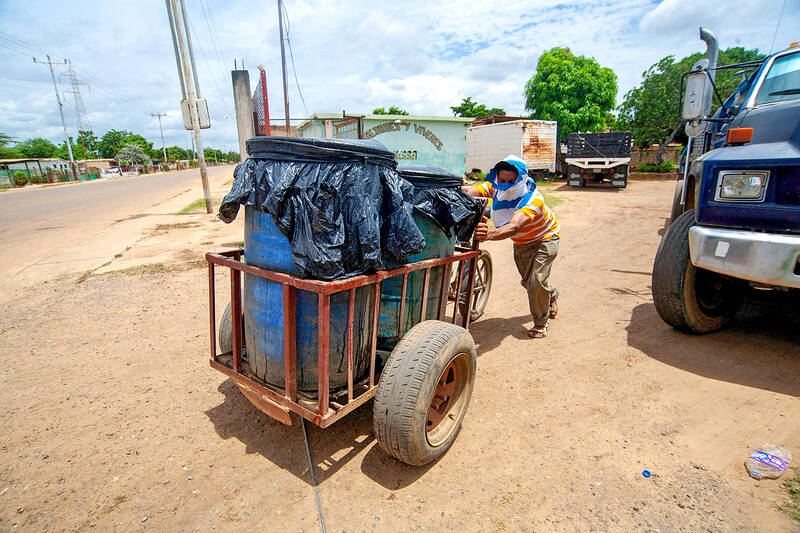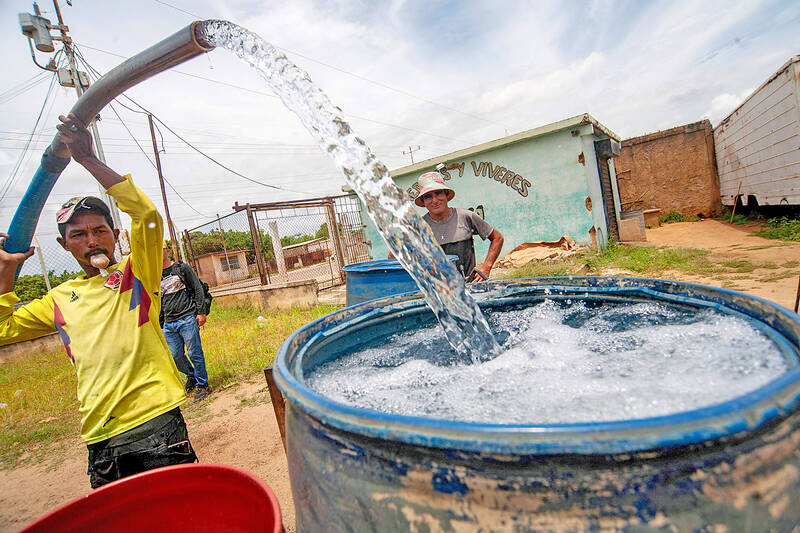In Venezuela’s oil capital of Maracaibo, a drilling frenzy has led to dozens of new wells — but the valuable liquid being pumped out is just water, not petroleum.
In a symbol of the woes of Venezuela’s crumbling economy, the once-flourishing oil town of 2 million people is parched.
Experts blame the nationwide shortage of drinking water on corruption and years of underinvestment and mismanagement by national and local governments, resulting in frequent water cuts.

Photo: AFP
The corroding infrastructure has led to schools, homes, businesses, churches and health centers all digging their own wells — at a huge expense.
A private well costs between US$1,000 and US$6,000, a fortune in the sanctions-hit Caribbean country where the minimum monthly wage is about US$200.
As a result, homes that come with a ready-made well and generator — Venezuelans also live with recurring power cuts — sell for a premium. While water rationing has been in place in Venezuelan cities for years, the situation in Maracaibo has become critical, as pumping stations break down, old pipes leak and reservoirs run dry.

Photo: AFP
No water came out of the taps in certain parts of the city for more than a month at the start of this year.
Manuel Palmar and six other families in the lower-middle-class neighborhood of Ziruma saw the writing on the wall four years ago. They each paid US$2,500 to build a 12m-deep well, which can store up to about 80,000 liters of spring water each week.
Now when Palmar turns on the tap, water gushes out for free.
The water is not fit for drinking due to its high salinity — saltwater from the Caribbean Sea seeps into Lake Maracaibo, a coastal lake used as a freshwater source — but “it’s perfect for washing clothes and flushing toilets,” he said.
“It’s a blessing!” the 34-year-old accountant said.
There is a solution of sorts for every budget.
Some residents fill 200-liter drums at official filling stations or communal taps for US$2 to US$3. Others order a water truck to fill their building’s tank for between US$40 and US$60. Some even recycle the water produced by the tropical city’s ubiquitous air conditioners or collect rainwater.
However, those are all quick fixes.
Over the past six years, more residents have begun digging wells to guarantee their long-term supply for the future.
Gabriel Delgado has built about 20 wells in Maracaibo, including at a heart-disease clinic and four private schools. He also built one at his mother-in-law’s home: a gray cement cylinder, one and a half meters in diameter, buried under metal sheeting and rocks. Cobwebs dangle just above the water level, but as soon as he activates the pump, water pours forth.
It is crystal clear, unlike the yellowish liquid that flows from the city’s taps during the rainy season, and Delgado eagerly sips it. Venezuelans must receive authorization from health and environmental authorities before drilling a well, and they are required to provide water samples for testing to ensure it is fit for consumption once it is built.
However, not everyone bothers. Javier Otero, head of Maracaibo’s municipal water department, said that he had come across shallow artisanal wells built near sewers or polluted ravines.
“Some people drink water that is not potable, that is brackish,” he said.
The municipality has built seven wells to supply Maracaibo’s poorer neighborhoods.

In Italy’s storied gold-making hubs, jewelers are reworking their designs to trim gold content as they race to blunt the effect of record prices and appeal to shoppers watching their budgets. Gold prices hit a record high on Thursday, surging near US$5,600 an ounce, more than double a year ago as geopolitical concerns and jitters over trade pushed investors toward the safe-haven asset. The rally is putting undue pressure on small artisans as they face mounting demands from customers, including international brands, to produce cheaper items, from signature pieces to wedding rings, according to interviews with four independent jewelers in Italy’s main

Japanese Prime Minister Sanae Takaichi has talked up the benefits of a weaker yen in a campaign speech, adopting a tone at odds with her finance ministry, which has refused to rule out any options to counter excessive foreign exchange volatility. Takaichi later softened her stance, saying she did not have a preference for the yen’s direction. “People say the weak yen is bad right now, but for export industries, it’s a major opportunity,” Takaichi said on Saturday at a rally for Liberal Democratic Party candidate Daishiro Yamagiwa in Kanagawa Prefecture ahead of a snap election on Sunday. “Whether it’s selling food or

CONCERNS: Tech companies investing in AI businesses that purchase their products have raised questions among investors that they are artificially propping up demand Nvidia Corp chief executive officer Jensen Huang (黃仁勳) on Saturday said that the company would be participating in OpenAI’s latest funding round, describing it as potentially “the largest investment we’ve ever made.” “We will invest a great deal of money,” Huang told reporters while visiting Taipei. “I believe in OpenAI. The work that they do is incredible. They’re one of the most consequential companies of our time.” Huang did not say exactly how much Nvidia might contribute, but described the investment as “huge.” “Let Sam announce how much he’s going to raise — it’s for him to decide,” Huang said, referring to OpenAI

The global server market is expected to grow 12.8 percent annually this year, with artificial intelligence (AI) servers projected to account for 16.5 percent, driven by continued investment in AI infrastructure by major cloud service providers (CSPs), market researcher TrendForce Corp (集邦科技) said yesterday. Global AI server shipments this year are expected to increase 28 percent year-on-year to more than 2.7 million units, driven by sustained demand from CSPs and government sovereign cloud projects, TrendForce analyst Frank Kung (龔明德) told the Taipei Times. Demand for GPU-based AI servers, including Nvidia Corp’s GB and Vera Rubin rack systems, is expected to remain high,